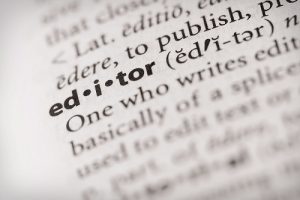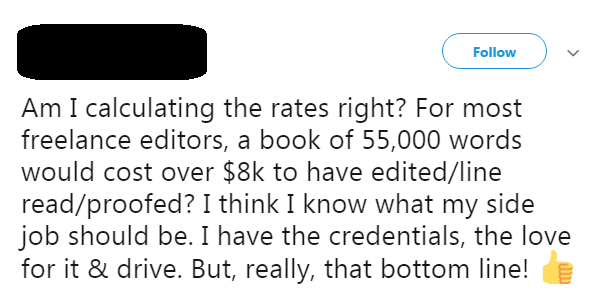
Continuing from last week’s post, where I talked about the reason some writers are wary of editors, this week I’m going to explain how to find an editor of your own. (Or editors, if that’s how you roll.)
Editing is an essential part of preparing your work for publication, whether you write short stories, novellas, or full length novels. No matter how strong your-self editing game is, a manuscript can always benefit from a second, trained set of eyes.
Here’s why.
Sometimes we’re blind to our own flaws
You’ve painstakingly woven this fictional world from scratch, all the way down to the tiniest details that make it tick. It works. It makes sense– either on a scientific or magical basis. There’s a reason and an explanation for everything. But sometimes when you commit 70,000 to 150,000 words to paper, a few things get overlooked.
Then there’s your own revision process (you do reread and revise a couple of times before sending your manuscript to an editor, right?) And sometimes during the revision process, important details get shuffled around or misplaced. Maybe you have your hero bandaging a wound with a particular item of clothing in one scene– an item he irretrievably lost three scenes prior. It happens.
No one’s grasp of the English language is perfect
My English is pretty good, but there are undoubtedly differences between how I use it and how Strunk & White and the Chicago Manual of Style feel it should be used. I’ll also be the first to admit that I’m not always perfect in my use of punctuation.
During my own revision process, I do the best I can. (And you should too. Ignoring things that you could fix yourself will wind up costing you in the long run.) I want the finished product to be as close to perfect as possible, so I hire a professional to iron out the bugs I can’t see or figure out how to fix.
Typos are sneaky
By typos, I’m not referring to the simple stuff that spell check should catch. I’m talking about words that are correct– just not in the context in which they’ve found themselves. Missing words. Misplaced words. And of course missing or misplaced punctuation.
The human brain is a beautiful thing. It will helpfully fill in or skip over all kinds of errors to keep you from breaking stride while you’re reading, even if you’re specifically looking for those things. The more often you’ve reread a particular piece, the more easily the human brain fills in the blanks. In short, you will be never be your own best proofreader.
That’s not to say you shouldn’t proofread your own work, though. The cleaner your manuscript is, the less editing will cost you.
How to Find a good editor and make the most of their services
- Start looking for an editor early. Some are available right away, but others may be busy enough that you’ll need to schedule your book six months or more in advance.
Caveat: The length of the wait doesn’t always correspond to the quality of the editor. Don’t assume that an editor who’s available right away is unskilled. They could be new to the freelance market or just less-than-stellar at marketing themselves. - Start your search by looking for editors who work with your genre. If you write hard science fiction and cyberpunk, editors who work almost exclusively with romance and erotic urban fantasy may not be a good fit for you– no matter how good their resume and pricing looks.
Does it seem like all the science fiction editors are hiding? Check out the awesome people of the Scifi Roundtable! They have editors, proofreaders, book formatters, and even artists and cover designers. - Do your homework. Check out the editor’s website and social media. How do they represent themselves? Do they have a good relationship with current and past clients? Do other authors in your genre recommend them?
- Not all editors will provide a list of authors they’ve worked with, but many do. Use Amazon’s “look inside” feature for books they’ve edited. How does the final product look?
Contacting Your Chosen Editor
- Introduce yourself in a professional manner whether you’re contacting an editor via email, Facebook, Twitter, or somewhere else. This should go without saying, but here it is: treat your editor as courteously as you’d like to be treated.
- Check out their website and see what they do before you query to avoid asking questions they’ve already answered. (Editors often state up front which genres they edit, what types of editing they do, and how much they charge for each.)
- If it’s not stated on their website, ask what genres they edit and if any of the subjects your book features are a no-go for them. Likewise with pricing.
- Don’t pester them or post an angry rant if they turn you down or don’t reply. Sometimes life happens, and I’d rather know up front that they’re not interested in what I write.
- Once you’ve reach the point where you both feel like you’re a good fit for each other, ask for a sample edit. This is generally the first chapter or the first x number of pages, and gives you an idea of what to expect and what the editor can do for you.
What should editing cost?
Some editors state up front that they charge x cents per word. A few charge per page or per hour. Others state that the price depends on the manuscript.
When it comes to determining a reasonable rate for the editing you need, the answer is complicated. Some professionals swear that anything lower than 3 cents a word is the sign of a sub-par editor. Others contend that if you pay anywhere near that much, you’re being fleeced.
People are fond of saying that you get what you pay for, but the truth isn’t that simple. Some excellent editors provide their services for incredibly low prices; I know one who only charges $.003/word. Likewise, you can and will bump into editors asking $8,000 for a full edit package (developmental through final proofread) on a 70,000 word novel. Is the more expensive service 38 times better than the bargain priced one? I don’t know– I’m not wealthy and selling a kidney didn’t seem like a viable business model.

The good news is that if you’re willing to do a little research, you can find a quality editor (or team of editors) to fit most price ranges. And once people start reading your book, all the time, effort, and money you put into editing will pay off.
But what if you’re on such a tight budget that even the thought of paying a few hundred dollars makes you wince? In my next post, I’ll detail some steps you can take to produce a clean, publication-ready manuscript without breaking the bank. Stay tuned!

1 thought on “How to Catch an Editor And Why You Should”